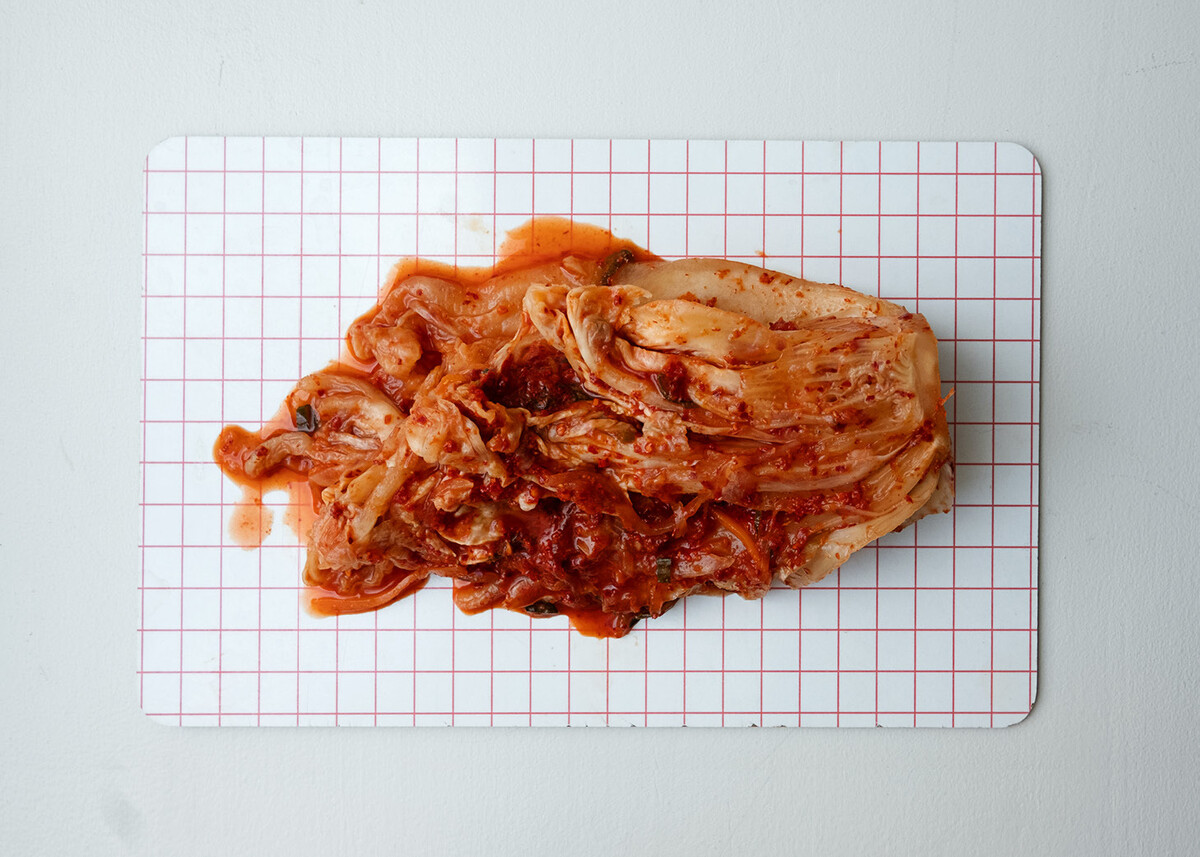Franziska Wick, die Gründerin des Fermentista Festivals und passionierte Fermentations-Lehrerin, hat sich der Magie der Mikroorganismen verschrieben. Sie hat in den letzten vier Jahren über 1000 Studenten unterrichtet. Sie schult in öffentlichen Kursen, Corporate Events und an der Culinary Arts Academy Switzerland. Auch dieses Jahr teilt sie ihre Expertise beim Soil to Soul Symposium, wo sie mit Begeisterung ihr Wissen über Fermentation, Gesundheit und Nachhaltigkeit weitergibt.
Was hat dich dazu inspiriert, dich auf Fermentation zu spezialisieren? Gab es ein Schlüsselerlebnis?
Ja, es gab tatsächlich ein Schlüsselerlebnis, welches aus dem Nichts die Fermentation in mein Leben katapultierte. Dies war im Jahr 2018 im Zürcher Seefeld, als ich einen Sauerkraut-Kurs besuchte. Ich wusste absolut nichts über das Fermentieren, ausser, dass eine Ernährungsberaterin mir empfohlen hatte, meine angeschlagene Gesundheit mit Fermentiertem zu unterstützen. Nichtsahnend ging ich zu diesem Kurs. Bereits am gleichen Abend arbeiteten die Mikroben in meinem nach Hause gebrachten Glas gesalzenem Kohl – es zischte und blubberte. Sofort war ich zurückversetzt in meine Kindheit; als Tochter eines Internisten und einer medizinischen Laborantin wurde bei uns am Mittagstisch tagtäglich über Mikroben gesprochen. Damals halt nur über die bösen, die nützlichen Mikroben bekamen vor 40 Jahren noch wenig Aufmerksamkeit. Von Bakterien, Viren und Pilzen war ich deshalb seit Kindsbeinen fasziniert, und da ich am besagten Sauerkraut-Tag im Jahr 2018 bereits einen Food-Blog schrieb und leidenschaftlich gerne kochte, trafen an jenem Samstag zwei meiner grossen Welten aufeinander. Ich entschied mich danach ziemlich schnell zu einer Fern-Ausbildung in Fermentation in den USA und, wie man so schön sagt, the rest is history.
Wie viel Platz nimmt die Fermentation in deinem Alltag ein? Und auf deinem Speiseplan?
Aus beruflichen Gründen fermentiere ich mehrmals pro Woche, da ich in meinen Kursen meinen Teilnehmenden stets eine warme Mahlzeit mit Fermenten koche und ihnen viele weitere Fermente zum Probieren gebe. Privat schaue ich, dass ich täglich 1-2 Esslöffel rohes, fermentiertes Gemüse esse zur Unterstützung meiner Gesundheit – dazu mehr weiter unten. Auch selbstgemachten Milchkefir trinke ich aus diesem Grund regelmässig. Selbstgemachter Kimchi als Geschmacksgeber wird ebenfalls gerne und häufig in meiner Küche verwendet, in allem Möglichen, von Pizza über Kimchi-Pancakes und Nudelsuppen bis zum Umami-Kick fürs Popcorn. Auch Miso und Shio Koji sind treue Begleiter, ebenso Tempeh und Sauerteigbrot. Ich liebe es, Getränke zu fermentieren, aber ich mache dies hauptsächlich für meine Kurse, da ich selber aus gesundheitlichen Gründen keinen Zucker über Getränke konsumieren sollte.
Welche Rolle spielt die Fermentation in unserer heutigen Ernährung, insbesondere im Hinblick auf Gesundheit und Nachhaltigkeit?
Man sagt, dass etwa 30% unserer Nahrung fermentiert ist, aber da spricht man von den herkömmlichen Fermenten wie Joghurt, Käse, Salami, Brot, Bier, Wein, Essig und unauffälligen Zutaten wie beispielsweise Zitronensäure – industriell hergestellte Zitronensäure ist ein Schimmelferment von Maiskörnern und wird nicht aus Zitronen gewonnen. Wir sind aber nun in einer Zeit, in der eine andere Art von Fermenten an Aufmerksamkeit gewinnt – Kimchi, unpasteurisiertes Sauerkraut, Tempeh, Misopasten, Sauerteigbrot, Kombucha. Vor allem seit der Pandemie steigt der Wunsch der Konsumenten nach gesünderen und nachhaltigeren Nahrungsmitteln, und die obigen Fermente haben sich in dieser Kategorie einen festen Platz erobert. Pflanzenbasierte fermentierte Lebensmittel übernehmen verschiedene Aufgaben im Bereich Gesundheit und Nachhaltigkeit; ihre Texturen und Umami-Noten können tierische Produkte ersetzen, unpasteurisiertes Gemüse und Getränke liefern für unsere Gesundheit wertvolle Elemente wie nützliche Bakterien, Säuren, Enzyme, kurzkettige Fettsäuren. Durch Fermentation können regionale, saisonale Gemüse und Früchte haltbar gemacht werden und damit Food Waste und Importe gesenkt werden. Zudem ist die Fermentation zuhause einfach auch faszinierend: Man gibt den gewünschten Mikroben ihr benötigtes Umfeld, und sie veredeln Lebensmittel, oft ganz ohne unsere Hilfe.
FOOD ZURICH hat sich die «Kulinarische Zukunft» zur Vision gemacht. Welche Rolle wird die Fermentation in der Ernährung von morgen einnehmen? Wo liegen die Chancen von Fermentation?
Die Fermentation wird in Zukunft in der Ernährung noch eine viel grossere Rolle spielen als heute. Einerseits sehen wir uns konfrontiert mit steigenden Zahlen von modernen chronischen Krankheiten, andererseits suchen wir nach schmackhaften Alternativen zu tierischen Produkten, die ohne viele Zusatzstoffe auskommen. Industriell wird die Fermentation ganz sicher in den kommenden Jahren einen immer grösseren Platz einnehmen – die globalen Investitionen in solche Firmen sprechen eine klare Sprache. Dies wird einerseits der Fall sein bei der Herstellung von fertigen Lebensmitteln, vor allem im Bereich Alternative Proteine, andererseits in der Präzisionsfermentation, wo noch viel mehr möglich ist und möglich werden wird. Ich wünsche mir, dass auch die Gastronomen in Zukunft noch mehr auf die Fermentation zurückgreifen werden, um ihren Gästen spannende, nachhaltige und gesunde Menus anbieten zu können, und natürlich, dass viele Menschen die transformative Kraft von Fermentiertem für sich entdecken.
Du unterrichtest an der Culinary Arts Academy Switzerland am Genfersee, gibst Online-Kurse, machst Workshops für Firmen – und hast so über 1500 Studenten erreicht. Welche sind die häufigsten Missverständnisse oder Mythen über Fermentation, denen du begegnest?
Einerseits, dass sich Fermentation auf Sauerkraut und Kombucha beschränkt; vielen Menschen ist nicht bewusst, wie viele Lebensmittel einen Fermentationsprozess durchlaufen haben. An der Culinary Arts Academy, einer internationalen Kulinarik-Akademie, gebe ich den Studenten jeweils die Aufgabe, zu recherchieren, was in ihrem Heimatland alles fermentiert wird. Dies ist für die meisten ein augenöffnendes Erlebnis. Das zweite ist der Glaube, dass Fermentation zuhause gefährlich und kompliziert ist. Mit einem soliden Grundverständnis über Mikroben und Techniken sind viele Fermente, beispielsweise Gemüse oder Getränke, sehr sicher, sogar sicherer als das heiss Einmachen. Leider gibt es viele schlechte Rezepte von unerfahrenen Autoren, die durchaus gefährlich sein können oder zumindest nicht zum Erfolg führen. Ich empfehle deshalb in jedem Fall, einen Kurs bei einer erfahrenen Fachperson zu besuchen.
Was rätst du Fermentations-Neulingen, womit sollen sie starten?
Neulingen empfehle ich, mit der Milchsäurefermentation von Gemüse zu beginnen, insbesondere die Fermentation von Gemüse in hinzugefügter Salzlake. Dies ist die einfachste Art, in das Gebiet der Fermentation und Mikroben einzusteigen, da die Milchsäurebakterien die pflegeleichtesten aller Mikroben sind. Danach eignet sich Sauerkraut, um weiterzuüben. Auch Hefegetränke wie Tepache (wilde Hefe der Ananas) oder Sima (Zitronengetränk mit Sekthefe) oder Milchkefir sind einfache Fermente zum Starten. Etwas komplizierter ist es, ein richtig gutes Kimchi oder einen geschmacklich abgerundeten Essig herzustellen. Auch die wilde Hefe vom Ingwerbier macht nicht immer genau das, was sie soll, und benötigt etwas Fingerspitzengefühl. Sauerteigbrot, Tempeh und die Herstellung von Koji-Reis zähle ich zu den schwierigeren Fermenten. Herkömmlicher Käse und Fleisch sind dann die Königsklasse.
Auf welche Fermentation-Highlights dürfen wir uns am Soil to Soul Symposium freuen?
Wir haben einen vollbepackten Tag zusammengestellt, an dem die Besucher von früh morgens bis spät abends tief in die Welt der Fermentation eintauchen können. Meine persönlichen Highlights sind diese zwei: die Keynote von Antoni Gandia, dem Fermentista und Biotechnologen bei Planted, der in der Entwicklung des fermentierten Planted.Steak involviert war, und der Fermentista Lunch, an dem Fermentista und Koch Matteo Leoni die Gäste mit einem Viergänger mit vielen verschiedenen Fermenten bekochen wird, während ich viele Hintergrundinfos und Geschichten zu diesen Fermenten erzählen werde – die Gäste tragen dazu Kopfhörer, es ist ein tolles, immersives Erlebnis. Es wird weitere Keynotes geben, einen BYO Fermentations-Flash, eine Fermentationskaraoke und viele andere Gelegenheiten, sich mit der internationalen Fermentista-Community auszutauschen, die sich jedes Jahr an unserem Festival zusammenfindet. Auch weniger erfahrene Fermentistas und Anfänger sind sehr herzlich willkommen an all unseren Networking-Events, wir sind eine tolle Community mit einem ganz grossen Herzen, wir schliessen alle sofort mit ein.

Welche Trends oder Innovationen siehst du in der Zukunft der Fermentation? Und wie glaubst du, dass sie die kulinarische Welt beeinflussen werden?
In diesem Bereich passiert gerade wahnsinnig viel! Einerseits ist die Fermentation ein Schlüsselelement in der Bewegung hin zu einer Ernährung, die reich an Pflanzen ist. Die Fermentation ermöglicht, Texturen und Geschmäcker von tierischen Erzeugnissen nachzubilden. Dies geschieht einerseits im industriellen Bereich – Beispiele sind das Planted.Steak oder vegane Garums –, aber auch in der Gastronomie selber. Als Daniel Humm über Nacht beschloss, das Eleven Madison Park neu komplett pflanzenbasiert aufzustellen, kam er sehr schnell bei der Fermentation an für Alternativen zu vielen tierischen Produkten, wie zum Beispiel sein bekannter Sonnenblumen-Butter. Auch im Bereich No-Low-Drinks passiert gerade sehr viel; Hefen werden modifiziert, um spannende Getränke mit sehr niedrigem Alkoholgehalt zu produzieren. Die Präzisionsfermentation generell, und diejenige im Bereich Alternative Proteine speziell, findet auch in der Investorenwelt zurzeit viel Beachtung. Die Fermentation, eine der ältesten Kochtechniken, erlebt gerade ein tiefgreifendes Revival und wird die kulinarische Welt im grossen Stil beeinflussen und uns mit in die neue Welt begleiten. Neue Geschmäcker, neue Texturen, neue Produkte werden aus diesem Revival entstehen, an die sich die Menschen langsam gewöhnen und sie in ihre Ernährung einbinden werden.
Eine abschliessende Frage noch zum Thema Darmgesundheit. Das Mikrobiom, die Gemeinschaft von Billionen Mikroorganismen, die unseren Darm bewohnen, spielt eine entscheidende Rolle für unsere Gesundheit. Durch den Verzehr fermentierter Lebensmittel können wir wichtige Mikroorganismen direkt in unser Mikrobiom einführen, was zu einer besseren Darmgesundheit und allgemeinen Wohlbefinden führen kann. Wie können bestimmte fermentierte Lebensmittel gezielt genutzt werden, um das Mikrobiom zu verbessern und so die Gesundheit zu fördern?
Dies ist eine sehr spannende Frage und ich muss vorausschicken, dass wir bei der Forschung in diesem Gebiet noch in den Kinderschuhen stecken – erst seit etwa 2005 können wir mittels Gensequenzierung die Mikroben im Menschen im grossen Stil untersuchen. 20 Jahre sind in einem solch komplexen Gebiet eine noch sehr kurze Zeitspanne. Trotzdem haben wir bereits viele Erkenntnisse gewinnen können. Mit dem heutigen Wissensstand ist es so, dass wir wohl mittels der Konsumation von Fermenten keine neuen Mikroben in unserem Darm-Mikrobiom ansiedeln können. Zudem ist es bei fermentierten Lebensmitteln so, dass wir nicht genau wissen, welche Mikroben und in welcher Menge wir zu uns nehmen, ungleich einem Probiotikum aus der Apotheke. Nichtsdestotrotz sprechen die heutzutage sehr zahlreichen Studien dafür, dass gewisse Fermente bei regelmässigem Verzehr signifikante gesundheitliche Nutzen haben, beispielsweise auf das Immunsystem, den Stoffwechsel, die Entzündungswerte im Körper und die Hirngesundheit. Konkret sind dies unpasteurisierte fermentierte Gemüse wie Sauerkraut und Kimchi, selbstgemachter Milchkefir und die zwei Getränke Kombucha und Wasserkefir, sofern sie ungefiltert, unpasteurisiert und tief im Zuckergehalt sind. Bereits ein Esslöffel Sauerkraut oder ein Glas Milchkefir täglich kann unsere Gesundheit und das Mikrobiom signifikant stärken.



